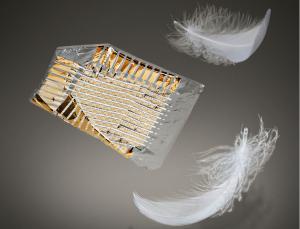
These sensors can be bent, stretched, crumpled and placed in wet environments without affecting their ability to operate. Photo courtesy: University of Tokyo
Singapore: A diaphanous plastic sheet peppered with sensors could lead to the development of medical implants so unobtrusive that people scarcely notice them, or provide 'sensing skins' for prosthetic limbs or robots, according to a report published in journal Nature.
Materials scientists, led by Professor Takao Someya and Dr Martin Kaltenbrunner at the University of Tokyo in Japan, said their plastics-based circuitry is lighter than a feather and just one micrometre thin. It is also so flexible and tough that an implant based on it would be all but imperceptible when worn on the back of your hand, say, or lining the roof of your mouth, they added.
"This technology will lead to biomedical sensors that cause no discomfort at all to the wearer," said Professor Someya. "They could measure body temperature and heart rate in a stress-free way, and their shock-resistance means they will work even during sport and exercise," he added.
The sensors, which have the consistency of plastic food wrap, can be bent, stretched, crumpled and placed in wet environments without affecting their ability to operate - key characteristics of artificial skin designed to sense touch or temperature, said the report.




